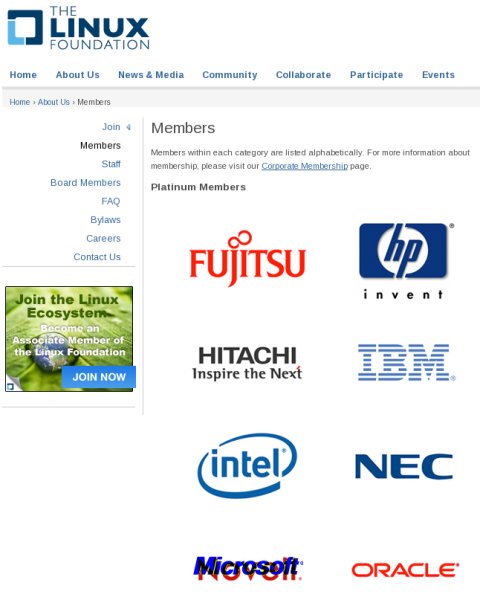04.08.14
Posted in GNU/Linux, Microsoft, Virtualisation at 11:17 am by Dr. Roy Schestowitz
Breaking the competition rather than competing

Summary: Microsoft’s Hyper-V is reportedly being used to cripple and marginalise — artificially — guests that are running GNU/Linux
MICROSOFT apparently has not gotten enough advantage with UEFI exclusion of GNU/Linux from new PCs. We recently learned that a lot of new computers (without Windows XP) will simply refuse to have GNU/Linux installed and/or running. Even some technical people in JoinDiaspora say that they are unable to install GNU/Linux on such computers (not OS-agnostic machines anymore, as per Microsoft’s manipulative legal requirements).
Adding insult to injury, Microsoft now uses Hyper-V, the proprietary hypervisor which is strictly attached to an NSA honeypot (Microsoft Windows), for something that resembles AARD. iophk called it “AARD again” and it should be treated as a serious antitrust violation.
Citing the original report [1], Susan Linton writes: “The Register is running an article explaining how Microsoft is trying to sabotage Linux.”
The article begins by stating that “Hyper-V was found to treat Linux guests as second-class citizens” and it should not be too shocking given that Hyper-V drivers for Linux were originally a GPL violation (Microsoft was forced to comply). This is one of the things that Microsoft paid Novell to help with (others being .NET, Moonlight/Silverlight, OOXML, patent FUD, and more).
With the death of Windows XP it is possible that the common carrier for desktops/laptops will soon be no more. FUD games like these ones are only to be expected from the thuggish, criminal company. █
Related/contextual items from the news:
-
If Microsoft’s Hyper-V was found to treat Linux guests as second-class citizens, the resulting storm of controversy would probably generate enough heat and light to make a dent in some climate change models.
Permalink
 Send this to a friend
Send this to a friend
02.07.14
Posted in GNU/Linux, Virtualisation at 9:29 am by Dr. Roy Schestowitz
Summary: Distortion of the field of virtualisation even inside the Linux Foundation, which allowed Microsoft to step right in
AS we briefly noted yesterday, OpenDaylight is having an event (summit) and some Linux journalists attend. This is interesting because through OpenDaylight there is now somewhat of a proprietary software mole inside the Linux Foundation, acting as a manager.
Recall the time Red Hat hired from Microsoft for virtualisation, repeating the mistake of some other GNU/Linux vendors. Red Hat is complaining about the USPTO [1] and Microsoft’s patent extortion, so what was it thinking when it hired from Microsoft? The same mistake was made by the Linux Foundation when it hired a former Microsoft employee to head OpenDaylight after Microsoft had paid a lot of money. To quote a new article, “Microsoft is invested in OpenDaylight” (as in, bought it off to a degree, just like it did with Novell). We spent year covering the distortion of virtualisation, especially by Microsoft. Lots of Microsoft executives took over VMware, a Microsoft ally bought Xen, and generally speaking the Novell deal enabled Microsoft to turn GNU/Linux into a guest under Windows hosts. It also allowed Microsoft to promote Hyper-V right inside Linux (initially a GPL infringement), essentially making Linux dependent on proprietary spyware with NSA back doors.
“As a platinum member, Microsoft is paying half-a-million a year to the consortium and devoted ten full-time developers to OpenDaylight. That may be small change for Microsoft, but it’s not chicken feed either. The company has already demonstrated the first release of OpenDaylight, Hydrogen, on Azure” writes Steven J. Vaughan-Nichols. Azure to GNU/Linux is surveillance and patent tax. Is this where Linux is going? Hosting by Microsoft, which engages in extortion and racketeering? This is worrisome and we’re not the only ones claiming so. █
Related/contextual items from the news:
-
A recent post on the top events ahead in 2014 for reforming abusive patent litigation focused on efforts by State Attorneys General, the Federal Trade Commission, and US Congress. Let’s now take a look to another field involved in the multi-prong strategy to address patent abuse: the Supreme Court, which is considering a number of important cases.
Permalink
 Send this to a friend
Send this to a friend
01.06.14
Posted in GNU/Linux, Google, Microsoft, Virtualisation at 12:27 pm by Dr. Roy Schestowitz
Summary: As GNU and Linux make it big in various platforms (especially for mobile devices) Microsoft is again trying to make itself a parasitic adjunct, neither invited nor wanted
Now that Android is truly dominant, Microsoft is trying to pretend that the only party one needs to pay to (for Android) is Microsoft. It’s the same thing Microsoft did to Novell and others. There might not be payments, but even pretense of payments is rather infuriating. It is a huge injustice which shows that we need to ostracise Microsoft.
GNU/Linux is quickly transforming into a market leader and the platform to catch up with. Microsoft is desperately trying to get a grip on Linux or “court Linux-based workloads with a new driver package that enables support for Red Hat Enterprise Linux/CentOS 5.5 and 5.6.” Having totally destroyed Linux at Nokia [1,2] (Nokia was a leading Linux contributor), Microsoft now uses its Novell moles to put code inside Linux, enabling dependence on proprietary software from Microsoft [3].
It is not hard to see why Microsoft resorted to this strategy of hijacking Nokia (alienating some other OEMs). Microsoft wants to control the hardware companies (like Dell) because with disasters like Vista 8 they just no longer pre-install (or rent) much of Windows [4]. Hyper-V is like a Trojan horse strategy and a Plan B, not just for servers. Microsoft is trying to dual-boot Windows along with Android devices right now. Nobody needs or wants it, but with enough moles it can become a reality.
Phones with GNU/Linux are coming (e.g. Ubuntu phones [5]), signaling a trend [6]. Even platforms which Microsoft tried to kill are coming back [7], notably WebOS (with Microsoft tax) and Tizen [8] (derived from MeeGo), not to mention Firefox OS [9,10] and Jolla’s Sailfish OS. Microsoft will try to impose inclusion of Windows (we see this in the press these days), but we must reject it and work hard against it. “I once preached peaceful coexistence with Windows,” Be’s CEO Jean-Louis Gassée once wrote. “You may laugh at my expense — I deserve it.”█
Related/contextual items from the news:
-
The company stops allowing developers to submit new applications or updates for the mobile operating systems.
-
When I started this ‘Bloodbath’ intense focus on the upcoming smartphone wars four years ago, I said the wars would bring a lot of change. Back in 2009 the world’s largest smartphone makers were very well known brands of the handset tech space such as Nokia, Blackberry, Palm, Motorola, HTC and SonyEricsson, with the upstart Apple iPhone having appeared only two years earlier. No Chinese smartphone maker was ranked in the Top 10. What happened has been dramatic, indeed the most volatile period of any global industry. Motorola and Palm died early and were sold. Ericsson quit the races leaving the partnership to Sony. Nokia was sold late last year. Blackberry is on the ropes and HTC is not faring much better. Four Chinese vendors have already crashed into the Top 10 (Huawei, Lenovo, ZTE and Yulong/Coolpad) with a fifth, Xiaomi likely to enter the Top 10 early in 2014.
-
-
Two articles caught my attention this week and both of them came from The Verge. Both stories came out within 2 days of each other. In that they both dealt with Microsoft talking about or actually reversing previous decisions about Windows 8, I had to wonder if this was Microsoft damage control at work. It would seem so.
It’s not just me. A lot of my friends in IT think the Windows 8 release was a disaster. Microsoft was seen as telling the computing public, “You will accept our new Windows and you will like it.”
Uh, no they won’t.
Early sales figures were far more than disappointing for the folks at Redmond. So disappointing in fact, that the company made public at least some intentions of making amends to their customers.
-
-
There’s no such thing as a saturated market — not at least for gadgets. And in the world of gadgets, there’s one field that happens to be a hot battlefield: MOBILE OPERATING SYSTEMS.
-
-
Samsung’s first Tizen phone reportedly will debut at Mobile World Congress Feb. 23, and will reach consumers in Europe and Japan in the second half of 2014.
-
LinuxGizmos is reporting that a new phone is coming this year that will let you run Android and Firefox OS with an x86 chip.
-
Permalink
 Send this to a friend
Send this to a friend
11.25.13
Posted in GNU/Linux, Kernel, Microsoft, Security, Ubuntu, Virtualisation at 4:14 am by Dr. Roy Schestowitz
We need Freedo

Summary: Involvement in Linux development from the NSA and close corporate partners means that in order to restore real trust some code may need washing away (Linux-libre style)
THE news last week claimed that the US Defense Department was embracing FOSS [1,2]. We already know that it uses RHEL extensively and this may actually have strings attached to it. See, there is always aspiration to put control of the software at the hands of US corporations (and by extension bureaucrats who can compel those corporations to comply with surveillance desires); for others, there are back doors.
The other day we saw how a leading GNU/Linux vendor worked to promote and to spread UEFI ‘secure boot’, which is all about remote control (unless the signatures are maintained by the physical owner of the computer). UEFI ‘secure boot’ — like TPM — is about control by remote entities like Microsoft. Never forget that man from Microsoft (who still lives around there) manages Ubuntu now. Another man from Microsoft is now speaking on behalf of a Linux Foundation project (there are other people, but he is their manager). This really is a cause for concern because even “Linux” technologies are turning somewhat hostile towards users. When companies like Intel and IBM call the shots and when companies like Red Hat try to appease the Pentagon we just simply cannot assume that Linux will remain user-serving (as a matter of priority).
There are some news these days about Italy [3,4], Switzerland [5] and several other European nations moving to Free/Open Source software (this may include GNU/Linux) for control and autonomy, but they should keep a close eye on those who steer Linux development (and the government they lobby to oversee them amicably in particular). Yesterday when I had a discussion about this subject someone suggested embracing Hurd, but I on the other hand thought that perhaps Linux-libre should start removing NSA-sourced components (if they can be traced back to the NSA, as it is not just SELinux and some was submitted by @redhat.com addresses) and other suspicious or user-hostile code.
Even as Linux advocates we should recognise that there is a diversity of interests and the agenda of the NSA is to spy on everything and everyone, not to protect our privacy and security. █
Related/contextual items from the news:
-
As far as technology trends in the federal government go, the use of open source is on a multi-year hot streak. Alongside movements such as the cloud, open source is one of those agency options like an oasis – or perhaps a mirage — in a funding desert, promising savings and efficiencies.
-
The Defense Department, looking for ways to cut costs and share information, is slowly but surely embracing open source software, sister publication FCW’s Amber Corrin reports.
“The problem with proprietary solutions is the limited set of folks who can use them, rather than opening the core components to the community to drive…and just be the experts and the integrators,” Andy Goodson, program manager for Lockheed Martin’s Distributed Data Framework, told FCW. DDF is a newly open source software search engine for intelligence.
-
It’s no hidden fact that the European Union has a special love for free and open source software for all the merits these have to offer and for the huge cost savings EU’s various organizations get to make from these. In the past, several member countries have made the switch from Windows to Linux in a drive to make their systems more secure and save costs. Their governments and educational institutions have also moved on from using proprietary and expensive day-to-day software such as Microsoft Office to using OpenOffice and LibreOffice, software that get the same work done and are absolutely free. Now it is Italy’s turn to follow on the same path.
-
We take a first reading of the recent modification to the fundamental law that governs the digital aspects of the Public Administration in Italy. These modifications require Public Administrations to prefer internally made solutions and FOSS solutions over proprietary ones, mandate an increased degree of interoperability and strengthen the push for open data.
-
Lausanne, Switzerland’s fourth-largest city, is considering a switch to open source desktop PCs. “The time has come to evaluate a migration, by launching a pilot project on 5 workstations”, the city announced on 14 November. “Free and open source software is becoming more mature, user-friendly and compatible with other environments.”
Permalink
 Send this to a friend
Send this to a friend
11.14.13
Posted in Kernel, Microsoft, Virtualisation, VMware at 3:27 am by Dr. Roy Schestowitz

Summary: Nicolas (Neela) Jacques is appointed by the Linux Foundation to be Executive Director, overseeing efforts that involve GNU/Linux vendors
MICROSOFT ENTRYISM is a serious problem. We already know what impact it has had on Yahoo! and Nokia. Microsoft also occupied VMware after EMC’s Tucci foolishly let Ballmer do this (almost all the top executives were Microsoft executives bringing in former colleagues). The Ubuntu project too is now steered by a former Microsoft employee (who still lives in Seattle, just like Elop) as the project angers more and more people [1, 2].
Among the VMware managers who are former Microsoft employees there is this guy who, after the Linux Foundation let Microsoft get closer (to OpenDaylight), becomes the Executive Director. “Until now, the OpenDaylight Project has not had its own Executive Director, but that has changed,” says this article. So now we have a former Microsoft manager in charge of a Linux Foundation initiative. Wonderful! What could possibly go wrong? █
Permalink
 Send this to a friend
Send this to a friend
04.15.13
Posted in GNU/Linux, Microsoft, Servers, UNIX, Virtualisation at 2:27 pm by Dr. Roy Schestowitz

Summary: Why Microsoft ‘supports’ GNU/Linux (while attacking it) and why one must never rely on Microsoft products for managing UNIXy machines
Using Hyper-V hype for eternal deception, Microsoft wants people to believe that it is playing nice with the competition, but this article reveals that words are not actions:
Microsoft’s System Center platform includes a wide range of options for configuring and managing Unix and Linux systems. However, when it comes to rolling out and managing virtual machines and creating private cloud environments, there’s not much room for Unix.
The reason Microsoft has been pretending to support rivals is that those rivals are now market leaders and it is not getting easier for Microsoft because even its booster face the reality:
Maybe the PC isn’t dead, but the upgrade cycle may be at death’s door, according to an IDC analyst.
In the wake of very ugly numbers released today by market researchers IDC and Gartner, Windows 8 is getting a lot of the blame.
It deserves that. Vista 8 is a failure that even Microsoft folks admit is a failure; this is why Microsoft is now focusing on bringing Office to other platforms and wants to ‘play nice’ with Linux. It is everything to do with profit, just like the patent extortion. Without the desktop monopoly, Microsoft at the back end becomes irrelevant too.
Recalling antitrust testimonies from Microsoft’s patent troll, and writing about lack of technical edge in Microsoft products [1, 2] (today I had to explain to someone that many people use Windows definiteluynot out of choice),
Pogson says that desktops/laptops are on the decline, citing some more numbers and analyses. The end of Windows domination was long-awaited by many. We’re beyond the tipping point now. Patents are a threat right now and so is Restricted Boot, so the next two posts will deal with each in turn. █
Permalink
 Send this to a friend
Send this to a friend
04.09.13
Posted in GNU/Linux, Kernel, Microsoft, Red Hat, Virtualisation at 10:07 am by Dr. Roy Schestowitz
2009 and before:

Summary: Money from Microsoft helps influence a Linux banding of companies that need virtualisation
AS Red Hat recently hired from Microsoft for virtualisation leadership we needn’t be shocked that in a Linux Foundation article from Zemlin [1, 2], with help or a boost from New York Times blogs that label it “Corporate Style” (as if ethics can be neglected when you deal with a corporation), Red Hat et al. enter into bed with Microsoft. This is widely covered, naming both the Linux Foundation and Microsoft. “Is Microsoft influence already making itself felt at Red Hat?” This is what Will Hill thinks. It is about virtualisation:
Recently, I argued that while there’s been a lot of Software-Defined Networking (SDN) hype, it’s also real and will redefine corporate networking in the coming years. The Linux Foundation agrees and — in its OpenDaylight Project — has introduced a community-led and industry-supported open-source framework to accelerate SDN adoption, foster new innovation, and give it a more open and transparent approach.
[...]
Red Hat will be working on building and delivering an SDN solution that integrates with OpenStack and Linux’s built-in Kernel-based Virtual Machine (KVM) hypervisor.
Microsoft hasn’t spelled out what it plans to contribute to the project yet.
For now, it provides funding and insists on making its virtualisation purely proprietary. Last year Microsoft indirectly (but more directly than before) paid the Linux Foundation as well. We has seen that before and it leads to self-censorship. █
Permalink
 Send this to a friend
Send this to a friend
07.28.12
Posted in Australia, GNU/Linux, Kernel, Microsoft, Virtualisation at 5:40 am by Dr. Roy Schestowitz

Summary: Removing Microsoft’s “boobs” from Linux would lead to technical complications
Microsoft’s decision to put “boobs” [1, 2, 3] in the Linux kernel (in the code, not the comments) is not so easy to fix by mere revision because some older builds now technically rely on the “boobs” being inside the code:
Microsoft Azure users may have their service disrupted as the software giant tries to rectify an embarrassing line of code, which roughly translates as “Big Boobs.”
The 0x0B16B00B5 string of code has been causing blushes for Microsoft since its presence was highlighted by coder Paolo Bonzini. B16B00B5 is leet speak for ‘Big Boobs’.
However, it was Matthew Garrett, who works for open source provider Red Hat, who claimed the code could cause problems for Microsoft’s public cloud platform.
Great. So Microsoft made Linux sexism-reliant. Thanks, chauvinist Microsoft [1, 2, 3, 4], and thank you, Novell, for letting Microsoft do this. What a disgrace.
Speaking of virtualisation, notice how the Australian government helps subsidise Microsoft. As Pogson puts it:
ATO has tax-filing software that only runs on that other OS. MacOS and GNU/Linux users are out of luck but the ATO will allow them to deduct from taxes the cost of running that other OS just to run the software, a pure subsidy of M$.
STUPID! STUPID! STUPID! Australians and their government do not owe M$ a living. M$ should work for a living and Australian taxes should not go directly into M$’s coffers. Make your software a web-application that any browser on any OS can access. Get your act together, ATO.
He is right, the “$” aside. This just helps show how out of touch the world has become; it aids criminals rather than their victims, taking up public money to make up for Microsoft’s loss [1, 2, 3]. Bailout? Too big to fail? Sociopaths get all the entitlements? █
Permalink
 Send this to a friend
Send this to a friend
« Previous entries Next Page » Next Page »






















 Content is available under CC-BY-SA
Content is available under CC-BY-SA